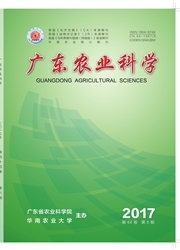

 中文摘要:
中文摘要:
以野生型拟南芥[Arabidopsis thaliana(L.)Heynh.]种子为受体,采用室内培养皿法,研究入侵植物桃金娘[Rhodomyrtus tomentosa (Ait.) Hassk.]不同部位、不同浓度的水浸提液对拟南芥种子萌发的化感作用.结果表明:(1)桃金娘叶、茎、根水浸提液对拟南芥种子的萌发均有不同程度的抑制作用,不同器官的化感作用强度为升>茎>根;(2)桃金娘茎0.2~0.25 g/mL浓度处理后的拟南芥种子发芽率与对照相比差异显著,分别减少了19.52%和24.58%,同时其各个浓度处理的种子发芽指数和种子活力指数的化感作用与对照之间均差异极显著,0.05 g/mL浓度处理与对照相比,活力指数减少75.89%;(3)桃金娘根浸提液和茎的高浓度浸提液对拟南芥幼苗苗长呈现促进作用,但是对其幼苗鲜重呈现一定的化感抑制作用,特别是0.05 g/mL浓度处理的桃金娘茎浸提液对幼苗鲜重的化感效应指数为-0.7077;(4)桃金娘叶浸提液的各个浓度处理的综合化感效应均比较强,桃金娘茎、根浸提液均在0.05 g/mL浓度时化感抑制效应最强,其RI值分别为-0.4511和-0.2137.0.25 g/mL的根浸提液具有促进的化感效应(RI=0.18).
 英文摘要:
英文摘要:
Allelopathic effects of different concentrations of aqueous extracts from different plant tissues of invasive plant Rhodomyrtus tomentosa on the seed germination of A rabidopsis thaliana were studied through indoor petri dish method. The results showed that: (1)The allelopathie effects of aqueous extracts from leaf, stem and root on the seed germination varied much, and the intensity of allelopathic effects of different organs was leaf〉stem〉root. (2)The difference of germination rate of A. thaliana reached the significant level between the stem treatment groups of 0.20~0.25 g/mL and control group. The germination rate decreased by 19.52% and 24.58%, respectively. Extreme significances of germination index and vitality index existed between the different concentrations of stem treatment and control group. What's more, the vitality index of the stem treatment group of 0.05 g/mL decreased by 75.89% compared with control group. (3)The root extracts in all concentrations and the stem extracts in higher concentrations exhibited promoting effect on seedling length, while they presented inhibiting effect on seedling fresh weight. Espacially, the response indexes of seedling fresh weight of 0.05 g/mL stem treatment group reached -0.7077. (4)The leaf extracts had strong comprehensive allelopathy in all concentrations. The stem and root extracts both had the strongest comprehensive allelopathy in the concentration of 0.05 g/mL with the RI of - 0.4511 and -0.2137, respectively. The stem treatment group of 0.25 g/mL showed promoting allelopathy on A. thaliana.
 同期刊论文项目
同期刊论文项目
 同项目期刊论文
同项目期刊论文
 期刊信息
期刊信息
